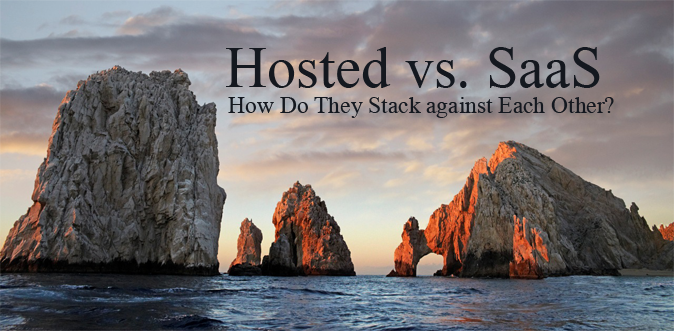Hosted vs. SaaS- How Do They Stack against Each Other?

Hosted vs. SaaS
In cloud computing, the difference between SaaS and hosted flavors has been a major source of confusion for many people. Some cloud computing providers will confuse the issue even more by mixing up the two terms and not providing clear definitions. Understanding the difference between hosted and SaaS is crucial to choosing your cloud flavor.
The right cloud computing flavor is vital for your IT infrastructure. That’s why we’re going to clearly describe these two flavors to help you choose the right one. Let’s start with SaaS.
Software as a Service (SaaS)
With SaaS, you are essentially renting servers, communications, data storage, message capacity and many other resources. The amount and type of resources you get ultimately depends on the provider you choose. In most cases, users pay in minute increments according to their usage, and scaling up or down as needed can be done.
Advantages of SaaS
Some of the advantages that you are bound to enjoy with SaaS include:
- The software is often already configured and installed which means it takes very little time from installing to using.
- Because it is shareable or a multitenant environment, SaaS is relatively affordable for most.
- SaaS solutions are often scalable and easily integrate with other SaaS solutions.
- They are easy to upgrade since the cost of new releases is generally low.
- The platform is very easy to use.
Disadvantages of SaaS
Its disadvantages include the following:
- Sensitive data is not completely secure, because with SaaS data is stored online or on third party servers.
- There is the inherent risk that stored data may be lost.
- It is completely dependent on high speed internet.
- There is a lack of predictability when it comes to costs.
Hosted
The idea of hosted services is ancient in the world of IT. This is where you essentially purchase a software solution from a Value Added Reseller (VAR). You then implement the solution just like you would any on-premise solution. Payments on a hosted solution are either made upfront or hourly depending on your agreement with the provider.
Advantages of Hosted
Some of the advantages of hosted include:
- You essentially have an indefinite license because you own your software.
- You data is in a secure Datacenter and there is no danger of loss or damage
- You can also easily transfer your applications in-house with minimal difficulty
- The cost of a hosted solution is predictable because in most cases you only pay it once.
Disadvantages of Hosted
Hosted solutions do have their disadvantages.
Some of the most prominent ones include;
- Hosted solutions require a fair amount of bandwidth to work correctly
- If you lose your internet connection, you may not be able to access your data
- This solution is not easily integrated with other solutions
SaaS and hosted are very different when it comes to their pros and cons, as our analysis clearly demonstrates. Whichever you choose, ensure that it is applicable to your business IT infrastructure needs.
Which one of the two do you use or would consider using? Share your choice and reasons with us.
- Small Business Website: Building a Strong Online Presence - March 11, 2025
- Top 10 Best Practices for Implementing DRaaS in 2025 - January 20, 2025
- Signs of Cyber Attack and How to Respond to them? - March 25, 2019
